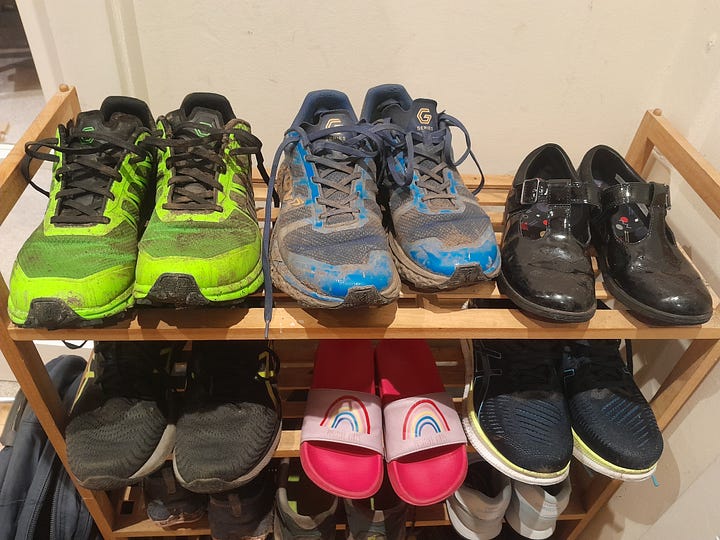Running vs family - the balancing act
What do your children think of your running challenges and active pursuits?
“Come on, you’re nearly there!”
“But Daddy, I need a rest.”
“You can rest at the finish line!”
This, I am pleased to say, is not me, but an example of some parental motivation I see fairly often at junior parkrun.
I sometimes marshal on a Sunday when I’m free, and occasionally one or both of my daughters will run. The youngest (7) sometimes marshals with me, mainly because she likes a reason to wear a hi-vis vest and tell people what to do (who doesn’t?).
I do quite a lot of running - I spend about 10 hours per week training and will have some full days out, plus occasional overnight or multi-day adventures.
As such, two major balancing acts are going on:
How much should I encourage the children into the sport that I love?
How do I allocate my time between family, my hobby, and other things like work, housework and other tasks?
The first one feels more straightforward. Both my wife and I have interests we want to make available to them (hers is music) but not push them into. We want them to have hobbies and interests but don’t hugely mind what those things are. Hence the optional parkrun, which sometimes secures a chilled day thereafter and maybe a cake. Or a walk up a hill, with a possible run down, and definitely a cake. I’m sure you all recognise the motivations here.
The second one is harder. Mrs K and I want to keep things balanced, which means we share work, home tasks, and childcare. As with many couples, we went through the shock when our eldest was born of finding our free time disappears almost entirely, and each partner has to eke out some time for themselves.
After a bit of trial and error, we reached the conclusion it was important for both of us to have some time out, and as the children got older it would be important for them to see that their parents both had lives and interests. But crucially, none of this should eat too much into family time. I don’t want to be absent from their evenings and weekends and recognise the draw of what might be achieved with a little more training, and what this might cost.
Richard Kendall: Ultra competitive?
In a short, fast race everyone is your enemy - it matters if you can get five yards ahead of them. Whereas in an ultra, everyone is your friend…
I’ve found when balancing training ambitions with family commitments, a bit of imagination is required. Quite often, it has meant turning down club runs (clash with bedtime) or races (generally at weekends), and running at fairly unconventional times of day.
It has required calendar coordination with Mrs K, so we know who gets an evening for their own leisure purposes.
Generally, I have looked for efficiency in training time, so that the total time away from home has to be worth it. I’d never drive a long way for a short run (this also fits with aims to be greener), and have a general rule that the active time must exceed the travel time. Also, some cunning plans to sneak extra runs in, such as running to work, or running home from a day out. Some activities are both beneficial for training and time-efficient - such as strength and conditioning work, or intervals, and these are better than chasing ever-increasing mileage for a whole host of reasons.
Planning the year is also important. Before kids, holidays used to be a great time to train, Mrs K would gladly have a lie-in or a leisurely wander around a market while I ran. Now, those times are the worst times to run. So when planning when to race or take on big challenges, it’s better to assume the school holidays will be rest or taper times.


But is it working? Am I a sufficiently present father? Do I inspire the girls to have active lives, to any meaningful degree? Only one way to find out…
I asked the kids two questions, basically, does my running have any negative effects on them, and does it have any positive effects on them?
The main thing they both said was that they don’t like it when I’m out, and this applies equally to a long run, or if I’m at work all day and then do a short run in the evening: what they value is time with me, and they miss that time when I’m not there. They have a moderate interest in dot-watching, but generally don’t care whether I’ve been involved in some epic adventure or the mildest type of social run.
They didn’t see any direct read-across between my running and their own physical activity, but when pushed a bit, did mumble something about thinking exercise is “something people should do,” and “if you didn’t do any, we wouldn’t want to either”.
In conclusion, I think I learned a few things from my chats with the girls and then reflecting on it. Efficient use of time is definitely the right way to go - maximum training value for minimum time cost.
Time with family is a good counterweight to the self-imposed or social pressure to train more, and for everyone that balancing point might look different.
There’s a marginal benefit to them in seeing that I am active. And, no surprises, they don’t really give two hoots about any running achievements - they would rather have my time than see any medals come home. Would I really want that the other way around?
Richard Kendall is a father of two, a keen and highly accomplished ultra-distance mountain runner and coach. He is based in the Peak District. In his spare time he is a civil servant. targetultra.com









Did you ask Mrs K what she thinks?